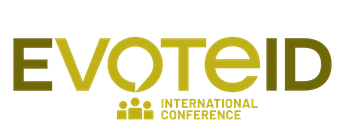Seventh International Joint Conference on Electronic Voting
4 – 7 October 2022 · Bregenz, Austria (hybrid format)
!!! Important Information !!!
The
conference venue
has changed and lead to slight changes in the
programme
. Please also check the updated
shuttle bus information
.
This is the seventh edition of one of the leading international events for e-voting experts from all over the world. One of its major objectives is to provide a forum for interdisciplinary and open discussion of all issues relating to electronic voting. This year we offer conference in hybrid format, with 100 physical seats in Castle Hofen, Bregenz, Austria and online. This year we have selected 2 invited keynotes and 25 presentations bringing together e-voting specialists working in academia, politics, government and industry in order to discuss various aspects of all forms of electronic voting (including, but not limited to, polling stations, kiosks, ballot scanners and remote voting by electronic means). Don't miss out and register now!
See the Preliminary Programme here
General Chairs: Krimmer, Robert (University of Tartu, Estonia), Volkamer, Melanie (Karlsruhe Institute of Technology, Germany), Duenas-Cid, David (Kozminski University, Poland and University of Tartu, Estonia)
Track 1: Security, Usability and Technical issues
Submission Deadline: 15 May 2022 at 23:59*
Notification of acceptance: 24 June 2022
Design, analysis, formal modeling or research implementation of:
- (Remote) Electronic voting protocols and systems: design and analysis;
- New types of voter identification and authentication;
- Ballot secrecy, receipt-freeness, and coercion resistance;
- End-to-end verifiability;
- Risk limiting audits;
- Requirements and formal modelling;
- Evaluation and certification, including international security standards;
- Risk assessment;
- voter authentication;
- human aspects of security mechanisms in electronic voting and in particular of verifiability mechanisms;
( *Hawaiian time, hard deadline, no extension)
Track 2: Governance of e-Voting
Submission Deadline:
15 May 2022 at 23:59*
Notification of acceptance:
24 June 2022
This track is intended to cover all non-technical issues that occur during the digital transformation of elections including, but not limited to the following:
- Legal, political and social issues of electronic voting implementations, ideally employing case study methodology;
- Interrelationship with, and the effects of, electronic voting on democratic institutions and processes;
- Cultural impact of electronic voting on institutions, behaviour, and attitudes of the Digital Era;
- Administrative, legal, political and social issues of electronic voting;
- Electronic voting legislation;
- Public administrations and the implementation of electronic voting;
- Understandability, transparency, and trust issues in electronic voting;
- Data protection issues;
- Public interests vs. PPP (public private partnerships).
( *Hawaiian time, hard deadline, no extension)
Track 3: Election and Practical Experiences
Submission Deadline:
10 July 2022 at 23:59*
Notification of acceptance:
14 August 2022
The experiences and practical reports of this track need not contain original research, but must be an accurate, complete, and, where applicable, evidence-based account of the technology or system used.
- Review developments in the area of applied electronic voting;
- Report on experiences with electronic voting or the preparation thereof (including reports on development and implementation, case law, court decisions, legislative steps, public and political debates, election outcomes, etc.);
Track 4: Poster and Demo Session
Submission Deadline: 15 September 2022
We invite Posters depicting new ideas or approaches you want to discuss with the community or summarizing papers you have published on other venues but you think are important for the E-Vote-ID community to know and to discuss. A Short Paper (see section on paper submission and proceedings) is requested.
Track 5: PhD Colloquium
Submission Deadline: 10 July 2022 at 23:59*
Notification of acceptance:
14 August 2022
The PhD Colloquium is a closed session for PhD students to foster the understanding and academic quality of their contributions. Each interested participant should ideally submit their research proposal (or alternatively ideas for papers, open problems, or other issues where feedback from colleagues would be helpful etc.) in the form of an extended draft using the conference platform. High-potential master students can also submit their work to the colloquium. The PhD Colloquium takes place on the day before the formal conference begins.
( *Hawaiian time, hard deadline, no extension)
Publication
Conference proceedings will be available at the time of the conference. Selected full papers accepted for the tracks on 'Track 1: Security, Usability and Technical Issues', and 'Track 2: Governance Issues' will be published in Springer LNCS.
All other publications accepted, including full papers in Track 3: Election and Practical Experiences, short papers accepted in any of the tracks, and from the submissions to the PhD colloquium will be published in proceedings with UT press.
Proceedings of previous conferences are available here .
Format of the Conference
The format of the conference will be a three-day meeting. No parallel sessions will be held, and sufficient room will be provided for informal communication.
Please note – the welcome reception will not take place on the evening before the first conference day, but has been combined with the poster and demo session on the evening of the first conference day on 5. October. It will be held in castle Hofen, where also the conference dinner will take place on 7. October. Notably, the conference dinner will feature the traditional "Cheese Road"!
Venue
The conference will be held in the Renaissance Castle Schloss Hofen, the prominent Renaissance castle of the Earls of Raitenau, has been home to the International Center for Science and Continuing Education since 1981. It is situated at the shore of Lake Constance in Lochau, which is right next to the region’s capital Bregenz. Further information on Travel and Accommodation .
